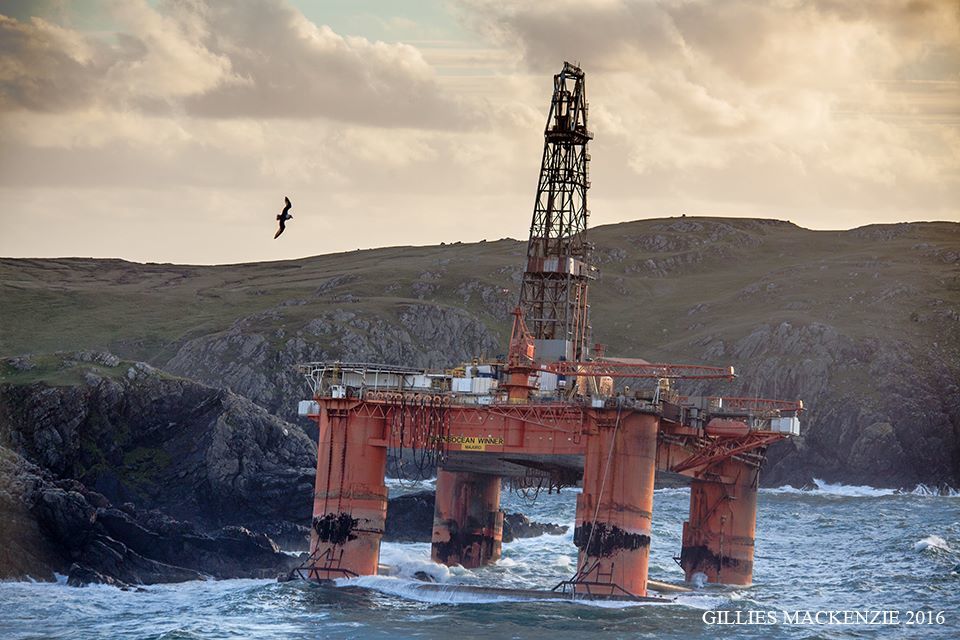
An official report into why the Transocean Winner oil rig crashed into rocks off the Western Isles has revealed a litany of problems including a worn tow rope, failing to consider high winds and an insufficient towing manual.
The findings prompted a call last night from environmental campaigners to prosecute the companies involved in the grounding and salvage likely to have cost more than £20million.
The Marine Accident Investigation Branch (MAIB) concludes in a report published today that the tug ALP Forward which was towing the 17,580-tonne Transocean Winner rig from Norway to Malta, struggled with the conditions it encountered. “Transocean Winner grounded as ALP Forward was incapable of controlling the tow in the high winds and seas experienced. The voyage planning concentrated on significant wave heights and did not consider the effect of high winds on Transocean Winner,” said the report.
“By the time the master realised that the tug and tow would not pass clear of the worsening weather, he had insufficient sea room to wait for it to pass. In his attempts to maintain control of the tow the master placed sufficient strain on the tow line to cause damage, which ultimately led to its failure.”
It was considered “very likely” that the rig would ground “regardless of whether the tow line held”.
The waves were thought to have reached more than 55ft while winds gusted to 59 knots.
Inspectors found the tow line in “a generally poor condition, with partial disintegration leading to a significant loss of strength.”
The investigation was also critical of the towing manual, which “contained insufficient information to enable the master to manage the safety of the tug and tow”.
All those failings have either been addressed or resulted in recommendations for action.
The MAIB also states that had the UK emergency towing vessel Herakles been on scene, it is “very unlikely that it would have been able to provide any practical assistance in maintaining control” of the rig.
Transocean Offshore International Ventures Ltd has reviewed its marine compliance procedures manual. Safety measures have already been enacted and the company has revised its rig movement checklist.
The MAIB also recommends that ALP Maritime Services reviews its procedures covering guidelines issued by the International Maritime Organisation.
About 53,000 litres of diesel poured from the rig when its four fuel tanks ruptured on initial impact near Dalmore Beach on Lewis during a storm on August 8 last year.
The rig remained there for a fortnight after its tow line broke, before it was finally towed free. It was ultimately loaded onto a carrier ship and taken to Turkey.
Richard Dixon, director of Friends of the Earth Scotland, said: “This is a very damning verdict, with terrible planning, poor information and damaged equipment all contributing to this very avoidable grounding. Clearly, prosecutions should be taken against the companies involved.
“The UK and Scottish governments have spent considerable sums on rescue, monitoring and clean-up operations and Transocean and ALP need to repay this expenditure in full.
“The rig should never have been under tow in such hostile conditions.”
Highlands and Islands Green MSP John Finnie said: “The Transocean Winner was a disaster looking for a location. The time has come for the communities that build the UK’s oil and gas sector to benefit from it coming to an end by gaining decommissioning work as we transition to a low carbon economy.
“We’re a maritime nation yet the UK Government continues to gamble with our precious environment by not providing adequate emergency tug vessel cover.”
A spokesperson for Transocean said: “Transocean remains grateful to all who provided assistance last summer when the tow to the Transocean Winner was lost during severe weather and the rig subsequently grounded off the Western Isles of Scotland, most especially the Isle of Lewis residents, the Maritime and Coastguard Agency and the Secretary of State’s Representative for Maritime Salvage and Intervention and the local communities.
“We will continue to meet our responsibilities arising out of this incident and appreciate the Marine Accident Investigation Board’s review and recommendations.
“For the past year and continuing through this August, Transocean has conducted regular surveys and inspections of the beach and grounding site, where no pollution has been detected. The Transocean Winner was sold in 2016 for recycle in an environmentally responsible manner with the recycling project completed early this year.
Alasdair Allan, MSP for the Western Isles, said: “Anyone reading this thorough investigation will be left troubled. Although, in the case of the Transocean Winner, no lives were lost and there was no significant environmental damage, the incident served to point to the huge danger the island economy and environment would face, if ever a vessel carrying a large amount of hazardous cargo found herself in a similar position.
“The report raises a number of worrying points, such as the lack of essential information, instruction or guidance in the towing vessel’s Towing Manual. This would have left the crew with insufficient information to carry out their duties and the fact that the report says that “such arrangements may not be unusual in ocean towage” is deeply worrying. It also raises questions about why the nearest Emergency Towing Vessel was 12 hours away in Orkney, which will again reopen the debate about why the Maritime and Coastguard agency removed the vessel from the west coast in the first place.”
ALP Maritime Services in the Netherlands could not be contacted.